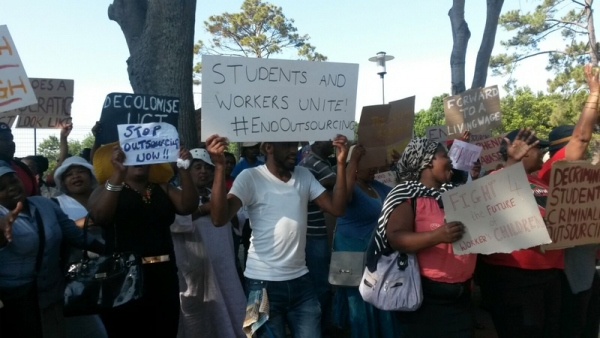What are the financial implications of insourcing at UCT?

On 28 October, University of Cape Town management signed an agreement with NEHAWU (the National Education, Health and Allied Workers’ Union) which commits the university to employ catering, transport, cleaning, security, and maintenance workers who work at UCT but are employed by outside companies. This promise of “insourcing” came in response to longstanding worker demands, and a period of intense protest in which outsourced workers were joined by many students and some UCT staff.
Editor’s summary
- UCT’s prescribed minimum wage for outsourced workers in 2014 was approximately R54,460 a year, excluding a 13th cheque.
- UCT’s lowest package for its own staff in 2014 was R93,448 a year.
- The cost of outsourcing in 2014 was R165 million.
- A report estimated that the cost of insourcing the outsourced staff in 2014 would have been R223 million.
- The difference between outsourcing and insourcing will “will have to come from the upper end of the current staff payroll”.
The agreement will put an end to more than 15 years of outsourcing, and the first workers are due to sign UCT employment contracts by June 2016.
While this is a significant achievement for workers, important details remain unresolved. The agreement itself is preliminary. For example, there is no clarity on the employment packages that will be offered to insourced workers, or whether contracts that were due to run for several more years will be cut short – the contract for residence catering runs until 2019.
There are also no up-to-date estimates of what it will cost UCT to bring the workers onto the payroll and buy the necessary equipment.
Professor Francis Petersen, UCT’s Deputy Vice Chancellor for Institutional Innovation, is in charge of a task team that he says will provide more clarity on these issues in the coming weeks. The team’s major focus is to investigate how workers will be integrated into the university’s pay class system, and how insourcing itself will be financed.
According to Petersen, the plan is to engage with worker representatives on these issues as they progress. The team will need time to talk to each of the companies about job descriptions, operational costs and potential escape clauses for current contracts. They also need time to examine the UCT budget.
Petersen is clear, however, that the additional cost of insourcing “will have to come from the upper end of the current staff payroll”, which implies that at these levels wages may not go up in line with inflation, or at all. He says this will also serve to reduce the levels of pay inequality at UCT.
Last year, permanent academic staff at UCT received a 9% increase.
Though UCT does not pay outsourced workers, the university does prescribe a minimum wage to the companies it contracts. UCT’s prescribed minimum wage for outsourced workers in 2014 amounted to approximately R54,460 a year (excluding a 13th cheque). At the same time, the Vice Chancellor’s salary was R 2,421,942 (excluding potential performance bonus), a ratio of 44:1.
If the insourced workers are brought in on the lowest, standard UCT in-house salary packages from 2014 (for administrative and support staff), of R93,448 a year, the ratio of the highest-to-lowest UCT employee would drop to 26:1.
It also remains unclear what the costs of insourcing will be. According to a report on outsourcing at UCT published in 2014, the annual budget for outsourcing was R165m, while the estimated cost of insourcing these services was R223m. Insourcing would also require some upfront purchases of assets and equipment and this was costed at R68m.
It is very difficult to estimate exactly what the cost structure of each outsourcing company is, but a rough estimate shows that on average the wage bill for outsourced workers in 2014 was between 40% and 60% of the total amount paid by UCT (R165m). The rest would be made up of operating costs, profit margins, and VAT (14%).
When workers are insourced, UCT will no longer be paying profit margins or VAT (though the university will pay VAT on equipment currently purchased by outsourcing companies). Even a conservative estimate of profit margins suggests that this would be a relatively substantial saving. But additional UCT personnel would likely be needed to manage the insourced staff.
In 2014 there were 1,197 outsourced workers across all six companies at UCT. If we assume that a typical outsourced worker is paid R93,448 a year (the lowest non-academic package), this would amount to a total wage bill of R111.8m, or 67% of the total amount budgeted for outsourcing in that year.
In conclusion, on the one hand UCT will save on VAT and on the companies’ profits. But on the other hand, if workers’ pay packages are more generous, insourcing could be significantly more expensive, especially if UCT has to create additional management posts and face higher operating costs.
This article was edited after publication. The sentence “But additional UCT personnel would likely be needed to manage the insourced staff.” was added. Also, Francis Petersen’s name was incorrectly spelt.
Support independent journalism
Donate using Payfast

Don't miss out on the latest news
We respect your privacy, and promise we won't spam you.
Next: National minimum wage part three: the options
Previous: Survey shows how unsafe Khayelitsha residents feel

This article is licensed under a Creative Commons Attribution-NoDerivatives 4.0 International License.
